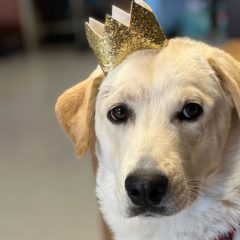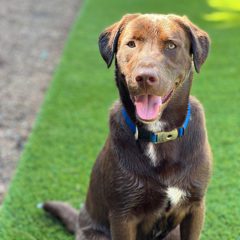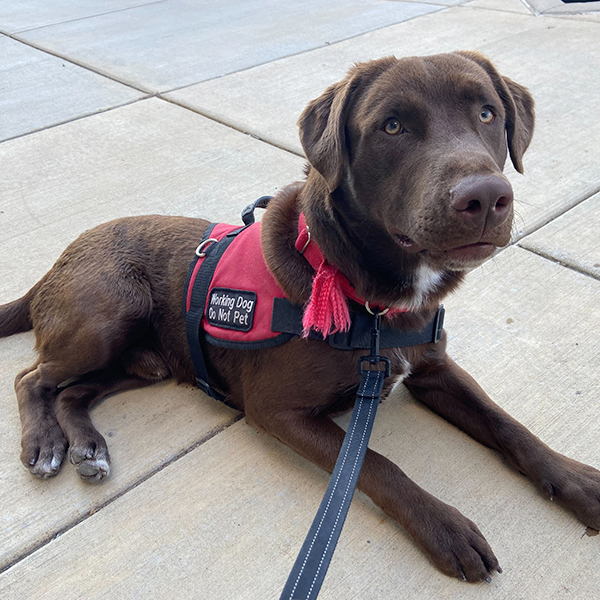When Dog and Man Rescue Each Other
After a Dogs for our Brave service dog meets the veteran it will be serving, there’s a “definite change in their attitude,” says April Haskins, Executive Director of Dogs for our Brave. “They lose interest in training and seem to be saying, ‘Ok, I’m ready now, let me get to work.’”
The pairing up of dog and service member takes place more than a year after a dog is identified for training, and then another three months of customizing the skills of the dogs happen before it’s placed in the home. “It’s a very intense and intentional process, because our main goal is a successful 50/50 partnership,” says Haskins.

The idea of Dogs for our Brave came after a chance meeting in 2013 between a Navy Seal and Founder Andy Gladstein, a successful California business man. Gladstein learned the man had been deployed 28 times and now was in charge of all the Seals on the Navy base in the city where they met. A friendship developed and when Gladstein was considering an anniversary gift for his wife, the veteran suggested buying a dog, having it trained and giving it to a soldier back from war who might need assistance.
Gladstein soon realized how difficult the suggestion was. He found an organization that matched soldiers with dogs but at an impractical cost of $25,000, and that did not include the costs of equipment, food, veterinary services and everything else the soldier would need to care for the dog. Providing free support for the lifetime of the dog was a must when Gladstein decided to offer his own solution through establishing Dogs for our Brave and is what, Haskins believes, still sets the organization apart.
“We want to give every veteran who may benefit from a service dog the opportunity to receive one without the financial burden,” she says. “So, we assume ownership of each of the dogs, which means we will cover all food, veterinary care and pharmaceuticals for the life of the dog.”
Today, Dogs for our Brave is based in St. Louis because “that’s where we found our incredible director of training, Paul Scimone,” says Haskins. An expert in canine behavior, Scimone created a training program that’s individualized to the behavior and psychology of each animal and tailored to the needs of each service member. In addition to dozens of assistance commands, the dogs also learn skills to assist with anxiety, PTSD episodes and nightmares.
Another unique aspect of the program, says Haskins, is Scimone’s desire and ability to prioritize working with dogs from a rescue or shelter. “Paul has extensive experience rehabilitating pet dogs for owners that had reached the end of their rope with behavioral problems, so there’s no challenge too big for him,” she says. “It takes a very special dog to do this job and rescued dogs have great potential. In this way, dog and veteran are rescuing each other.”
The dogs are paired with a veteran based on personality and hobbies that he or she enjoys. “If a service member likes to go hunting, we can’t have a dog that reacts to gunfire, for example,” says Haskins. Sometime around 15 months in, the dogs meet their veteran and then each spends the next three months in final training, the dog learning skills specific for the veteran, the vet learning all of the necessary commands, before the dog is placed in its new home.

Many of the dogs in training are sponsored by individuals, organizations or foundations. YouthBridge client, the Wayne C. Kaufmann Charitable Foundation, is sponsoring two dogs, Nala and Chip, currently in the program. YouthBridge has supported the Kaufmann family by providing suggestions and ongoing due diligence on its grantees.
To date, 17 dogs have been placed with service members. “We hear all the time how much their lives, their attitudes and motivation have changed since receiving their new companion,” says Haskins. “One veteran hadn’t left her house in 11 years, but with her dog, began taking short trips. I really can’t imagine doing anything else than helping to make this healing happen.”
If you would like to donate or have any questions about this organization, please contact Allison McDonald.
